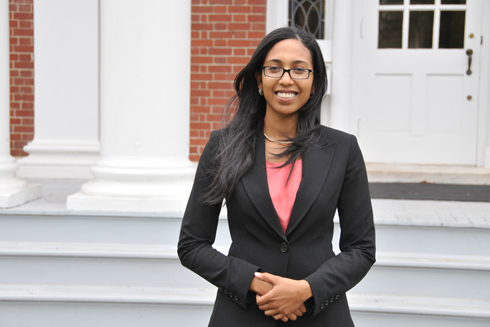Leah Wright: New History, African American Studies Assistant Professor

Leah Wright, assistant professor of history, assistant professor of African American studies joined Wesleyan’s staff this summer.
Wright says she loves being part of an interdisciplinary community and “was impressed by the intellectual curiosity and academic excellence of the students at Wesleyan.” Multiple factors attracted her to the university.
“I was also excited about the faculty—there is equal attention paid to teaching and research, and as a result, Wesleyan faculty excel at both. Joining Wesleyan was a major opportunity to join a vibrant and welcoming intellectual community.”
She graduated cum laude from Dartmouth College in 2003 with a bachelor’s in history. Wright went on to obtain a Master’s and a Ph.D. in History from Princeton University. This summer she defended her doctoral dissertation titled “The Loneliness of the Black Conservative: Black Republicans and the Grand Old Party, 1964-1980.” Wright is currently negotiating with publishers to convert her manuscript into a published book.
Wright’s book proposal abstract reads: “Traditionally, the scholarship on civil rights has assumed that the movement existed solely within the boundaries of liberalism; however, this project argues that black Republicans also attempted to promote a genuine agenda of racial equality, civil rights, and black uplift through the conservative movement and the Republican apparatus. Despite the seeming contradiction of African Americans working for civil rights in a party that appeared increasingly hostile to that very idea, many black Republicans did see themselves as part of the movement. In many ways this story is a comparative project about the vision for black equality and advancement.”
Her research interests include United States history, African American studies and American politics. Her extensive research on Black conservatives in the U.S.—specifically Black Republicans—combines all of her interests. Additionally, she has studied women in the Black Power movement and Marcus Garvey, the founder of the Universal Negro Improvement Association
Wright is the author and co-author of several articles, including “Conscience of a Black Conservative: The 1964 Election and the Rise of the National Negro Republican Assembly,” in Federal History.
Wright was awarded with a Woodrow Wilson Foundation Dissertation Writing Fellowship for 2008 – 2009. Notably, she has received three presidential libraries grants (i.e. the Lyndon Baines Johnson Presidential Library Research Grant, the Gerald Ford Presidential Library Research Grant and the George H.W. Bush Presidential Library O’Donnell Research Grant). Wright received multiple Social Science Research Council (SSRC) Development/Enhancement Grants throughout her scholarship. She was a Andrew W. Mellon Fellow from 2001 to 2003 and is the first Mellon Fellow to join the Wesleyan faculty, according to Krishna Wilson, who is the coordinator of the Mellon Mays Undergraduate Fellowship at Wesleyan.
This semester, Wright is teaching 20th Century Black Conservatism and The Long Civil Rights Movement in America. In spring 2010, she will be teaching Modern African-American History and U.S. Political History Since 1945.
For her civil rights course, Wright enjoyed working with Valerie Gillispie, Assistant University Archivist, to expose students to the resources within Wesleyan’s archives.
“The Civil Rights Archive at Wesleyan is a wonderful resource,” Wright says.
“Val Gillispie took us through a guided tour of archival resources that allowed the students to better understand Wesleyan’s significant connection to the broader Civil Rights Movement. It was an exciting opportunity for students to ‘get their hands dirty’—and search through interesting, and relevant archival resources—which is a critical component for any historian.”
Wright is a native of Hartford and enjoys traveling, reading, and watching college basketball (her brother plays for Providence College).
Listen to Leah Wright’s recent appearance on WNPR’s Where We Live.

